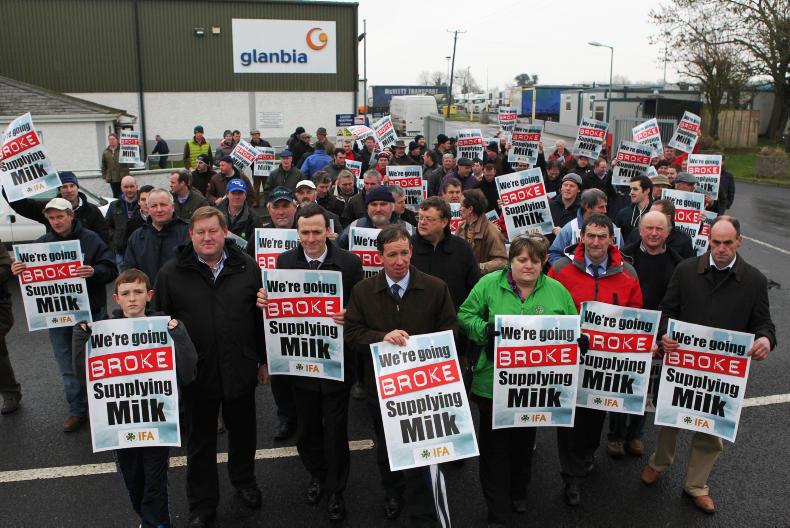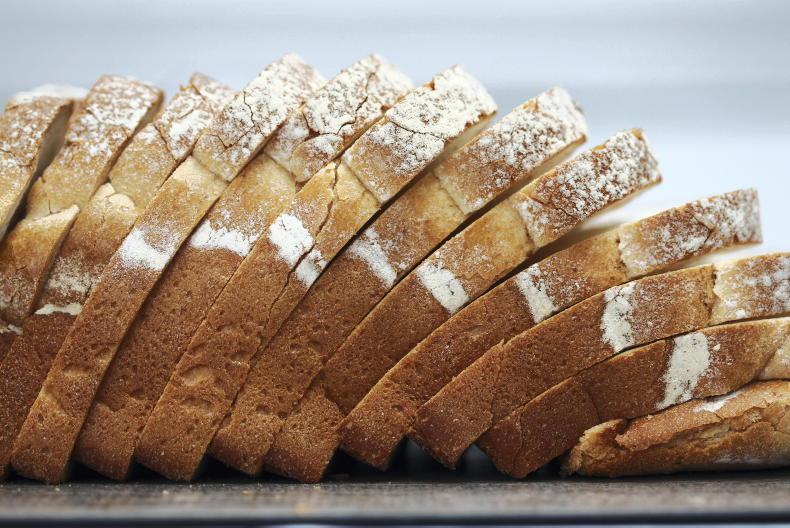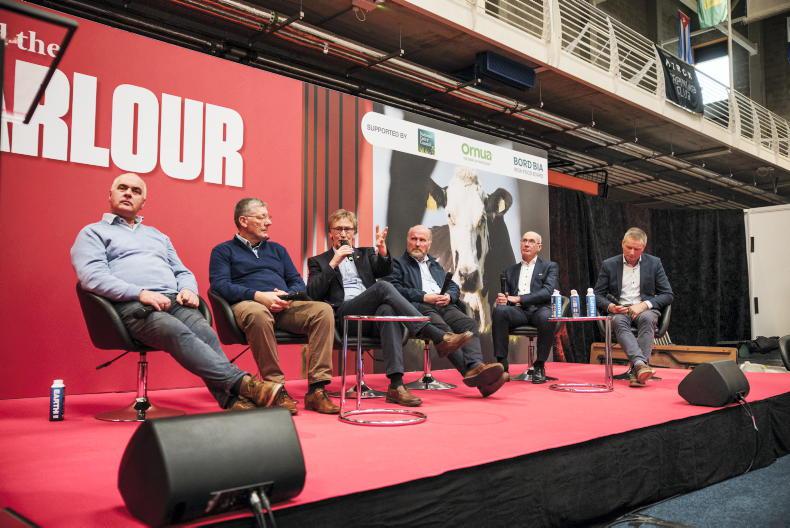Earlier this month, Northern Ireland-based dairy processor Strathroy won a major contract to supply an additional 18m litres of fresh milk to German discounter Lidl. Aldi just this week signed up a new contract.
Lidl sells an estimated 50m to 55m litres of fresh milk every year.
Aurivo and Arrabawn say they lost out on price as they weren’t prepared to sell any lower. For Aurivo, the loss of the Lidl contract equates to over 10% of its entire liquid milk business, while the lost volumes for Arrabawn represents almost 15% of its entire liquid pool.
Both co-ops will find a new home for this displaced liquid milk.
Scary price
Following the tender result, several sources within the dairy industry told the Irish Farmers Journal that the price Strathroy tendered to win the Lidl contract was significantly lower than other fresh milk producers. One industry source described the winning contract price as “scary” in terms of how low it was.
Strathroy director Ruairi Cunningham disputed this and said winning the contract was not merely down to price.
Ireland’s liquid milk market is already fiercely competitive
He argued that the company’s new plastic packaging system, which uses 20% less plastic, was a big part of the reason his company won the contract.
Either way, the big worry for liquid milk producers is the knock-on impact the Lidl-Strathroy deal could have in terms of other retailers asking for lower prices to match Lidl.
Ireland’s liquid milk market is already fiercely competitive and profit margins are extremely tight for milk processors.
Strathroy itself is probably the greatest barometer of profitability in processing liquid milk as its business is almost entirely focused on this sector. For 2019, accounts for Strathroy show its operating profit margin was razor-thin at just 0.44%.
However, Irish co-ops argue that the Omagh-based milk processor has an unfair advantage in sourcing milk in Ireland as it does not have to adhere to Irish Government regulations on paying for liquid milk.
Under the Regulation of Milk Supply Act 1994, all companies in Ireland that produce liquid milk must provide “adequacy of compensation” to farmer suppliers of liquid milk.
The act is also designed to ensure that the milk used for fresh drinking milk is of a high enough quality
This law was enacted to ensure there was a year-round supply of fresh milk in this country through the winter and that any farmers producing winter milk are guaranteed a premium for their produce to compensate for the extra cost of production.
The act is also designed to ensure that the milk used for fresh drinking milk is of a high enough quality and is not late-lactation milk from spring-calving herds. However, because Strathroy is based in Northern Ireland, it is not subject to this legislation and can buy milk in the Republic of Ireland without having to pay the liquid milk bonus to farmers that other co-ops are required to do.
The Irish Co-operative Society (ICOS) argues that this gives Northern Ireland milk processors an unfair advantage in the cost of sourcing milk here in the south, which they are passing on to retailers by undercutting Irish co-ops.
ICOS says this legislative anomaly results in Irish co-ops paying an average of almost 4c/l more for milk than was paid for Northern milk and estimates the purchase of unregulated liquid milk results in the loss of over €4m in income to Irish family farms.
At today’s exchange rate of 90p, the total cost of this pool of milk to Aurivo would have been just under €30m based on an average milk price of 30p/l
However, it must also be pointed out that Irish co-ops such as Aurivo, Lakeland and Glanbia also purchase unregulated milk in Northern Ireland.
Added to this, the weakness in sterling since the Brexit vote means paying for Northern Ireland-sourced milk has become increasingly attractive to border processors.
For example, Aurivo sourced around 90m litres of milk from suppliers in Northern Ireland last year. At today’s exchange rate of 90p, the total cost of this pool of milk to Aurivo would have been just under €30m based on an average milk price of 30p/l. However, if the UK currency was closer to 80p in value, the cost of this milk would be closer to €34m for Aurivo – an extra cost of €4m.
For Northern Ireland processors, the reverse is the case as buying Irish milk when sterling is weak adds to the cost.
Overall liquid milk imports from Northern Ireland (both packaged and bulk for processing) stood at 142m litres last year, which represents about 25% of the total liquid milk market in Ireland, according to the National Milk Agency.
However, given the significant volumes of Irish cheese and butter that are shipped into the UK market every year, including Northern Ireland, it’s hard to see how Irish co-ops can argue against Northern Ireland liquid milk finding its way on to shelves here in the south.
Perhaps what’s needed is an all-island regulatory approach to fresh milk sales in Ireland that puts every producer on an equal footing. However, with the UK now out of the EU, this approach is likely to be impossible.
Open the fridge door in almost every household across Ireland and you will find liquid milk in some shape or size. Irish consumers enjoy drinking milk. The average Irish consumer drank 118 litres of fresh milk last year, which is the highest rate of fresh milk consumption in the world.
While liquid milk is often the forgotten child of Ireland’s internationally focused dairy sector, it remains the largest consumer market in Ireland for any kind of dairy product in value terms. Last year, the liquid milk market in Ireland was valued at €514m, which was down slightly on the previous year.
Discount retailers Lidl and Aldi continue to open new stores in Ireland and now have a combined market share of 24% of the Irish grocery market
In all, almost 580m litres of fresh milk is consumed in Ireland every year, whether that’s in the home or milk consumed in restaurants, cafés and hotels. Three-quarters of all fresh milk is consumed in the home, with an estimated 434m litres of milk sold in supermarkets last year.
The food service industry accounts for a further 20%, or 116m litres, of the liquid milk market, while almost 5% of liquid milk is delivered to the door. The majority of this is via Glanbia’s online milk delivery initiative called MyMilkman.ie.
Discount retailers Lidl and Aldi continue to open new stores in Ireland and now have a combined market share of 24% of the Irish grocery market.
The German discounters are among the main retail channels for packaged fresh milk imports from Northern Ireland, although Dunnes Stores also sources significant volumes of Northern Ireland milk from its supplier Natural Dairies. Based in Co Donegal, Natural Dairies is a privately owned liquid milk processor that sources its milk from Northern Ireland and supplies liquid milk exclusively to Dunnes Stores. It is estimated that almost 70% of fresh milk sales in supermarkets are now sold as “own-label”, according to industry sources. The National Milk Agency says that two-litre packs of own-label fresh milk are sold at an average discount of 27% on brands such as Avonmore or Connacht Gold.
Farmers and co-ops have largely themselves to blame for the value destruction in liquid milk. The squeeze at both the selling end and the farmer end in terms of share of retail price has effectively made selling fresh milk a non-profitable, commodity business for farmers and co-ops. Why?
Catering, which accounted for 12% of the market 10 years ago, accounts for over 20% of the market in 2020
There are a couple of key reasons. The proportion of milk sold in supermarket multiples has increased significantly. If we look back 10 years ago, the percentage was 60%. This has now risen to almost 75%.
The supermarkets continuously use fresh milk as a loss leader to attract customers in on a regular basis.
Discounting as a promotional tool cheapens the product in the customer’s eyes and makes price a real issue over other issues such as quality or origin.
Catering, which accounted for 12% of the market 10 years ago, accounts for over 20% of the market in 2020. You don’t need to put high-value branded milk into catering.
Secondly, the introduction and growth of private label has further reduced the margin available to all persons in the supply chain.
Private label, or own-brand, means selling milk under the supermarket brand, eg Tesco or Dunnes Stores, rather than selling under the processor brand, eg Avonmore or Champion Milk.
Branded products such as Avonmore or Champion Milk attract a premium over and above the own-brand products, but if the cheaper own-brand products are stocked beside the premium products – price wins.
The supermarket wins again for its consumers. Private-label or own-brand milk has grown from 43% in 2010 to over 70% in 2020.
Thirdly, the farmer’s share of the final retail price again has continuously been reduced as the unit price has dropped. In 2007, the farmer was getting 39% of the retail price. In 2020, depending on what supermarket you go into, the farmer is getting about 34% of a lower-value product.
Price reduction
The retail price of a litre of milk in 2010 was 97c/l and in 2020 it is 89c/l, according to the National Milk Agency.
So the price of the litre has reduced and the share of the final retail price has reduced.
The price of bottled water, which involves a much shorter production cycle, is a lot higher in many supermarkets.
The thinking for the last 10 years is that rationalisation of the liquid milk processors in the Republic would bring some stability back to the market
The catch 22 for the farmers is that they wouldn’t sell the same volume of milk without the retailers.
So while on one hand they can argue on price, both parties know it’s a symbiotic relationship. One can’t do without the other.
The thinking for the last 10 years is that rationalisation of the liquid milk processors in the Republic would bring some stability back to the market, but that hasn’t materialised.
The squeeze at retailer level, coupled with the flow of milk into the Republic from Northern Ireland, means the power is with the retailer and there still are any number of processors willing to supply them with fresh milk.
Strathroy Dairy
The growth of Strathroy Dairy has been another thorn in the sides of the Republic processors. Strathroy can effectively buy milk in the North at Republic of Ireland manufacturing prices. The Republic of Ireland processors have to pay a premium for this year-round milk.
The liquid milk players can rightfully bow to the retailers and talk about plastic reduction in cartons, ticking a green box for the retailer. However, lorries driving up, down and across the country pitting farmers against each other does nothing for margins and even less for the environment.
A double-whammy that makes no sense for anybody
Where liquid milk was once able to pay for the processor parties and new cars, now the farmers must be content to produce costly milk and sell it into a very price-competitive market. A double-whammy that makes no sense for anybody.
Some will say that’s just business. Is it high time the co-ops and processors took a stand for farmers and the liquid milk sector and put the fresh milk into cheese or powders, instead of giving it away at little or no margin?
Read more
My Farming Week: William Chestnutt, Portrush, Co Antrim
Strathroy takes additional 18m-litre liquid contract with Lidl Ireland
Aurivo and Arrabawn lose out to Strathroy
Earlier this month, Northern Ireland-based dairy processor Strathroy won a major contract to supply an additional 18m litres of fresh milk to German discounter Lidl. Aldi just this week signed up a new contract.
Lidl sells an estimated 50m to 55m litres of fresh milk every year.
Aurivo and Arrabawn say they lost out on price as they weren’t prepared to sell any lower. For Aurivo, the loss of the Lidl contract equates to over 10% of its entire liquid milk business, while the lost volumes for Arrabawn represents almost 15% of its entire liquid pool.
Both co-ops will find a new home for this displaced liquid milk.
Scary price
Following the tender result, several sources within the dairy industry told the Irish Farmers Journal that the price Strathroy tendered to win the Lidl contract was significantly lower than other fresh milk producers. One industry source described the winning contract price as “scary” in terms of how low it was.
Strathroy director Ruairi Cunningham disputed this and said winning the contract was not merely down to price.
Ireland’s liquid milk market is already fiercely competitive
He argued that the company’s new plastic packaging system, which uses 20% less plastic, was a big part of the reason his company won the contract.
Either way, the big worry for liquid milk producers is the knock-on impact the Lidl-Strathroy deal could have in terms of other retailers asking for lower prices to match Lidl.
Ireland’s liquid milk market is already fiercely competitive and profit margins are extremely tight for milk processors.
Strathroy itself is probably the greatest barometer of profitability in processing liquid milk as its business is almost entirely focused on this sector. For 2019, accounts for Strathroy show its operating profit margin was razor-thin at just 0.44%.
However, Irish co-ops argue that the Omagh-based milk processor has an unfair advantage in sourcing milk in Ireland as it does not have to adhere to Irish Government regulations on paying for liquid milk.
Under the Regulation of Milk Supply Act 1994, all companies in Ireland that produce liquid milk must provide “adequacy of compensation” to farmer suppliers of liquid milk.
The act is also designed to ensure that the milk used for fresh drinking milk is of a high enough quality
This law was enacted to ensure there was a year-round supply of fresh milk in this country through the winter and that any farmers producing winter milk are guaranteed a premium for their produce to compensate for the extra cost of production.
The act is also designed to ensure that the milk used for fresh drinking milk is of a high enough quality and is not late-lactation milk from spring-calving herds. However, because Strathroy is based in Northern Ireland, it is not subject to this legislation and can buy milk in the Republic of Ireland without having to pay the liquid milk bonus to farmers that other co-ops are required to do.
The Irish Co-operative Society (ICOS) argues that this gives Northern Ireland milk processors an unfair advantage in the cost of sourcing milk here in the south, which they are passing on to retailers by undercutting Irish co-ops.
ICOS says this legislative anomaly results in Irish co-ops paying an average of almost 4c/l more for milk than was paid for Northern milk and estimates the purchase of unregulated liquid milk results in the loss of over €4m in income to Irish family farms.
At today’s exchange rate of 90p, the total cost of this pool of milk to Aurivo would have been just under €30m based on an average milk price of 30p/l
However, it must also be pointed out that Irish co-ops such as Aurivo, Lakeland and Glanbia also purchase unregulated milk in Northern Ireland.
Added to this, the weakness in sterling since the Brexit vote means paying for Northern Ireland-sourced milk has become increasingly attractive to border processors.
For example, Aurivo sourced around 90m litres of milk from suppliers in Northern Ireland last year. At today’s exchange rate of 90p, the total cost of this pool of milk to Aurivo would have been just under €30m based on an average milk price of 30p/l. However, if the UK currency was closer to 80p in value, the cost of this milk would be closer to €34m for Aurivo – an extra cost of €4m.
For Northern Ireland processors, the reverse is the case as buying Irish milk when sterling is weak adds to the cost.
Overall liquid milk imports from Northern Ireland (both packaged and bulk for processing) stood at 142m litres last year, which represents about 25% of the total liquid milk market in Ireland, according to the National Milk Agency.
However, given the significant volumes of Irish cheese and butter that are shipped into the UK market every year, including Northern Ireland, it’s hard to see how Irish co-ops can argue against Northern Ireland liquid milk finding its way on to shelves here in the south.
Perhaps what’s needed is an all-island regulatory approach to fresh milk sales in Ireland that puts every producer on an equal footing. However, with the UK now out of the EU, this approach is likely to be impossible.
Open the fridge door in almost every household across Ireland and you will find liquid milk in some shape or size. Irish consumers enjoy drinking milk. The average Irish consumer drank 118 litres of fresh milk last year, which is the highest rate of fresh milk consumption in the world.
While liquid milk is often the forgotten child of Ireland’s internationally focused dairy sector, it remains the largest consumer market in Ireland for any kind of dairy product in value terms. Last year, the liquid milk market in Ireland was valued at €514m, which was down slightly on the previous year.
Discount retailers Lidl and Aldi continue to open new stores in Ireland and now have a combined market share of 24% of the Irish grocery market
In all, almost 580m litres of fresh milk is consumed in Ireland every year, whether that’s in the home or milk consumed in restaurants, cafés and hotels. Three-quarters of all fresh milk is consumed in the home, with an estimated 434m litres of milk sold in supermarkets last year.
The food service industry accounts for a further 20%, or 116m litres, of the liquid milk market, while almost 5% of liquid milk is delivered to the door. The majority of this is via Glanbia’s online milk delivery initiative called MyMilkman.ie.
Discount retailers Lidl and Aldi continue to open new stores in Ireland and now have a combined market share of 24% of the Irish grocery market.
The German discounters are among the main retail channels for packaged fresh milk imports from Northern Ireland, although Dunnes Stores also sources significant volumes of Northern Ireland milk from its supplier Natural Dairies. Based in Co Donegal, Natural Dairies is a privately owned liquid milk processor that sources its milk from Northern Ireland and supplies liquid milk exclusively to Dunnes Stores. It is estimated that almost 70% of fresh milk sales in supermarkets are now sold as “own-label”, according to industry sources. The National Milk Agency says that two-litre packs of own-label fresh milk are sold at an average discount of 27% on brands such as Avonmore or Connacht Gold.
Farmers and co-ops have largely themselves to blame for the value destruction in liquid milk. The squeeze at both the selling end and the farmer end in terms of share of retail price has effectively made selling fresh milk a non-profitable, commodity business for farmers and co-ops. Why?
Catering, which accounted for 12% of the market 10 years ago, accounts for over 20% of the market in 2020
There are a couple of key reasons. The proportion of milk sold in supermarket multiples has increased significantly. If we look back 10 years ago, the percentage was 60%. This has now risen to almost 75%.
The supermarkets continuously use fresh milk as a loss leader to attract customers in on a regular basis.
Discounting as a promotional tool cheapens the product in the customer’s eyes and makes price a real issue over other issues such as quality or origin.
Catering, which accounted for 12% of the market 10 years ago, accounts for over 20% of the market in 2020. You don’t need to put high-value branded milk into catering.
Secondly, the introduction and growth of private label has further reduced the margin available to all persons in the supply chain.
Private label, or own-brand, means selling milk under the supermarket brand, eg Tesco or Dunnes Stores, rather than selling under the processor brand, eg Avonmore or Champion Milk.
Branded products such as Avonmore or Champion Milk attract a premium over and above the own-brand products, but if the cheaper own-brand products are stocked beside the premium products – price wins.
The supermarket wins again for its consumers. Private-label or own-brand milk has grown from 43% in 2010 to over 70% in 2020.
Thirdly, the farmer’s share of the final retail price again has continuously been reduced as the unit price has dropped. In 2007, the farmer was getting 39% of the retail price. In 2020, depending on what supermarket you go into, the farmer is getting about 34% of a lower-value product.
Price reduction
The retail price of a litre of milk in 2010 was 97c/l and in 2020 it is 89c/l, according to the National Milk Agency.
So the price of the litre has reduced and the share of the final retail price has reduced.
The price of bottled water, which involves a much shorter production cycle, is a lot higher in many supermarkets.
The thinking for the last 10 years is that rationalisation of the liquid milk processors in the Republic would bring some stability back to the market
The catch 22 for the farmers is that they wouldn’t sell the same volume of milk without the retailers.
So while on one hand they can argue on price, both parties know it’s a symbiotic relationship. One can’t do without the other.
The thinking for the last 10 years is that rationalisation of the liquid milk processors in the Republic would bring some stability back to the market, but that hasn’t materialised.
The squeeze at retailer level, coupled with the flow of milk into the Republic from Northern Ireland, means the power is with the retailer and there still are any number of processors willing to supply them with fresh milk.
Strathroy Dairy
The growth of Strathroy Dairy has been another thorn in the sides of the Republic processors. Strathroy can effectively buy milk in the North at Republic of Ireland manufacturing prices. The Republic of Ireland processors have to pay a premium for this year-round milk.
The liquid milk players can rightfully bow to the retailers and talk about plastic reduction in cartons, ticking a green box for the retailer. However, lorries driving up, down and across the country pitting farmers against each other does nothing for margins and even less for the environment.
A double-whammy that makes no sense for anybody
Where liquid milk was once able to pay for the processor parties and new cars, now the farmers must be content to produce costly milk and sell it into a very price-competitive market. A double-whammy that makes no sense for anybody.
Some will say that’s just business. Is it high time the co-ops and processors took a stand for farmers and the liquid milk sector and put the fresh milk into cheese or powders, instead of giving it away at little or no margin?
Read more
My Farming Week: William Chestnutt, Portrush, Co Antrim
Strathroy takes additional 18m-litre liquid contract with Lidl Ireland
Aurivo and Arrabawn lose out to Strathroy









SHARING OPTIONS